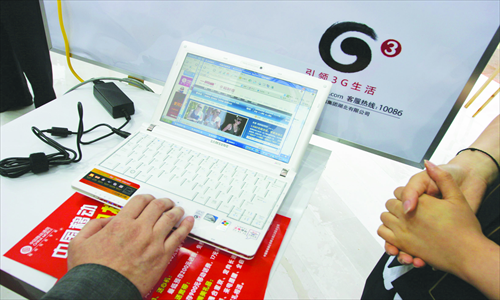Thriving or dying?
While many of the world's tech aficionados have been focusing on the newest and coolest gadgets, the fate of a slightly more old-fashioned device has also been making headlines recently.
Netbooks are expected to die out soon, following the decision by the two leading netbook manufacturers, Asus and Acer, to cease producing the devices, Taiwan-based industry publication Digitimes reported at the end of December.
"The netbook market will officially end after the two companies finish selling their remaining inventories," the report said. And it soon became a hot topic in the tech world.
The two companies will not continue netbook production in 2013, an industry insider told the Global Times on January 7 on condition of anonymity, explaining that Microsoft's latest Windows 8 operating system was the final nail in the netbook coffin.
The latest operating system, which Microsoft CEO Steve Ballmer described as a radical change from the software giant's previous operating systems, requires a higher resolution screen, a more powerful processor and longer battery life than netbooks can offer. Inability to run Windows 8, therefore, means an end to potential software updates for netbooks.
Acer refused to comment when reached by the Global Times and Asus could not be reached for comment.
Diminishing market
A random search for netbooks Tuesday on 360buy.com, the country's largest online retailer of electronic gadgets, found some 50 models, mostly made by the two Taiwan-based manufacturers.
The gadgets were selling for between 1,000 yuan and 2,000 yuan ($160 and $320), and about 10 of them were out of stock, with no stock renewals indicated for the near future.
Meanwhile, a search for smartphones and tablets yielded thousands of results.
The declining netbook market is even more obvious in brick-and-mortar stores, where salespeople seldom recommend netbooks to their increasingly tech-savvy customers.
"We do have a few netbook models. But why don't you consider the newest tablets or ultrabooks? They would be a little more expensive, but netbooks are already old-fashioned," said a salesperson at an electronics retail market near Beijing's Chaoyangmen subway station on January 6.
"After using the netbook for about a year, I found it less desirable than I expected," Lu Lu, a Guangzhou resident in her late 20s, told the Global Times.
Lu purchased an Asus netbook in early 2010 for about 2,000 yuan, but a year later she traded it in to buy a MacBook Air, Apple's flagship lightweight laptop, even though it cost a much higher price.
As an early technology adopter, Lu now owns a number of devices such as smartphones and tablets, and her once-prized netbook is already fading from memory.
Lu's experience is typical of many of the country's younger generation of tech fans, many of whom have been lured by the continuous advances in hardware and software, even though it results in a shorter lifecycle for the pricy devices.
In 2009, when the netbook market was at its peak, US-based market research firm ABI Research was optimistic about its prospects, predicting the advent of a new era with an array of netbooks flooding onto the market.
Two years later, however, the research firm made a sharp revision to its bullish forecast. According to its research, in the second quarter of 2011 tablets had already overtaken netbooks in terms of global shipments.
What's next?
The diminishing market for netbooks has spurred most large PC vendors such as Samsung, Dell and Hewlett-Packard to end their netbook production and move toward the market for tablets and lightweight laptops, or ultrabooks.
Asus and Acer have also been putting more emphasis on new tech trends, with both firms highlighting their newest tablets and ultrabooks, even though they have yet to confirm their exit from the netbook business.
A key factor behind netbooks' plummeting popularity is the availability of a number of alternative products in the market, Eileen He, a Shanghai-based industry analyst at market research firm Gartner Inc, told the Global Times.
Another factor is the falling prices of tablet computers in particular, which has drawn the attention of even the most price-sensitive consumers away from netbooks.
In China's market, there is a large number of manufacturers of affordable tablets, some of which sell for only several hundred yuan, making cheap netbooks even less appealing.
Some have noted that the rise of smartphones has also eaten into netbook market share, thanks to their relatively large screens and powerful performance.
But Gartner's He believes there is still some potential for netbooks in the Chinese market. "Demand for netbooks will remain in smaller cities and rural areas of the country, where average users may still be likely to opt for an affordable, PC-like gadget."
One possibility mentioned by tech firms was the idea of phablet, a combination of a phone and a tablet. The idea was boosted by Chinese handset maker Huawei, which unveiled a huge smartphone with a 6.1-inch display on January 7, taking smartphone screen size to a new level.
It might simply be a new segment of the mobile device market, or possibly a threat to the currently popular tablets.
But the ups and downs of the netbook market over the past few years are an indication of the volatility of the gadget world. It's still "hard to foretell" which product will be the next victim of the relentless march of tech progress, said He.
